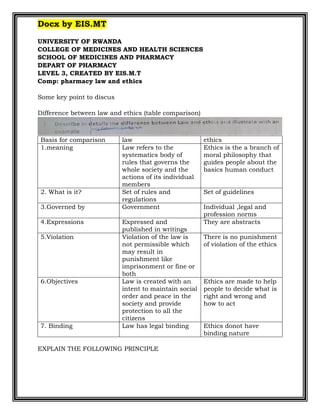PHARMACY ETHICS
- 1. Docx by EIS.MT UNIVERSITY OF RWANDA COLLEGE OF MEDICINES AND HEALTH SCIENCES SCHOOL OF MEDICINES AND PHARMACY DEPART OF PHARMACY LEVEL 3, CREATED BY EIS.M.T Comp: pharmacy law and ethics Some key point to discus Difference between law and ethics (table comparison) Basis for comparison law ethics 1.meaning Law refers to the systematics body of rules that governs the whole society and the actions of its individual members Ethics is the a branch of moral philosophy that guides people about the basics human conduct 2. What is it? Set of rules and regulations Set of guidelines 3.Governed by Government Individual ,legal and profession norms 4.Expressions Expressed and published in writings They are abstracts 5.Violation Violation of the law is not permissible which may result in punishment like imprisonment or fine or both There is no punishment of violation of the ethics 6.Objectives Law is created with an intent to maintain social order and peace in the society and provide protection to all the citizens Ethics are made to help people to decide what is right and wrong and how to act 7. Binding Law has legal binding Ethics donot have binding nature EXPLAIN THE FOLLOWING PRINCIPLE
- 2. Docx by EIS.MT Autonomy : independen decisions: eg patient to choose treatment Non maleficience: donot harm eg:dispensing drug with full information Beneficience: act in patient,s best interest eg: choosing best medicine to patient Justice: fairness in distribution of scarce medical resources Deontolgist : assess whether the action is good or bad,solely,against a set of , typically,societal norms Utilitarian assess the worth of the actions by the amount of good it produce
- 3. Docx by EIS.MT 1. I am guessing missions=objectives The Council shall be responsible for ensuring ï That the rules, honor and dignity of the pharmacy profession are complied with. ï Ensure the protection of public health. The Council shall ensure ï compliance with the principles of morality, integrity and dedication essential to the practice of the pharmacy profession ï That all its members comply with their professional requirements and the laws and regulations governing pharmacists. 2. The function and duties of the pharmacy council ï Approve the examination in pharmacy for purpose of qualifying person for registration as pharmacist ï To prescribe the subject in which the approved examination shall be held ï To approve the courses of study, piratical training in pharmacy for the purpose of administration to approved examination ï To prescribe the conditions and procedures for admission of candidates ï To prescribe the equipment to be made available to the students ï To recognize degree or diploma in pharmacy for purpose of registration as pharmacist ï To prepare and maintain the register of pharmacist or apprentices in pharmacy ï To register pharmacist and grant certificate of registration ï To lay down the standard of teaching and to be maintenance by institution conducting the approved courses of study Difference between the ethical committee and institution review board. To protect the human society To know and respect organization, functioning and competence of the Council of Pharmacists Rise up with an idea for this question and share


